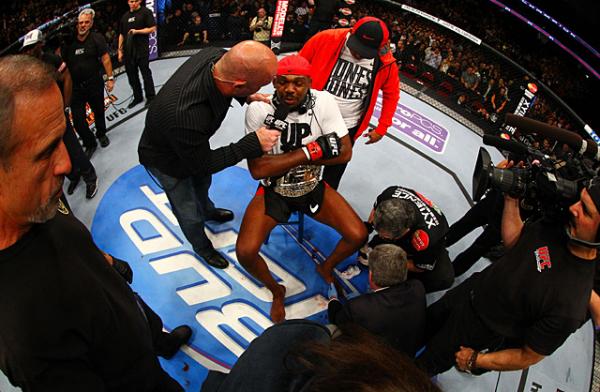Fight Medicine: A Night to Remember

Jon
Jones’ toe injury was not pretty. | Al Bello/Zuffa LLC/Getty
Images
UFC 159 “Jones vs. Sonnen” on Saturday at the Prudential Center in Newark, N.J., resulted in a string of some of the craziest injuries ever witnessed in a single night. It seemed at first as if eye pokes would become the biggest story coming out of the event, but soon, more significant injuries began to pile up. Perhaps the three most significant were the thumb of Yancy Medeiros, the eye of Alan Belcher and the big toe of Ultimate Fighting Championship light heavyweight titleholder Jon Jones.
From a medical point of view, it was a night to remember.
Advertisement
Belcher vs. Michael Bisping: Belcher’s eye is no stranger to the injury list, as he has had a detached retina repaired, not once but twice. A detached retina is a dangerous condition and can cause blindness if not repaired. In Belcher’s case, he dodged a bullet, so to speak. His eyeball was uninjured. Instead, it appeared he had a significant lower eyelid laceration, which was apparent when the ringside doctor pulled down his lower lid. Belcher received several stitches in his eyelid. The tricky thing about eyelids is that they have multiple, fragile layers and include tiny structures such as tear ducts; if damaged, those structures should be repaired using microscopes or other magnifying instruments. This injury is similar to what Randy Couture suffered at UFC 49, where Vitor Belfort’s glove grazed across Couture’s eyelid.
Jones vs. Chael Sonnen: In this match, Jones suffered what might be the biggest freak injury we have seen in the UFC yet. While pushing hard against Sonnen, Jones’ foot slid across the mat, and in the process, his toe got caught on the canvas. His foot continued to move, but his toe stayed where it was positioned, ripping it partially away from the foot and injuring his interphalangeal joint just below the nail of the big toe. Jones did not even notice the injury until UFC commentator Joe Rogan pointed it out during the post-fight interview. It remains a little unclear whether Jones suffered a dislocation or a fracture-dislocation, in which case there is a broken toe bone, as well as dislocation. In either scenario, it looked like the injury was “open,” meaning either the broken bone or the joint surface was exposed to the outside environment. Kevin Ware, a guard on the University of Louisville men’s basketball team, is probably the most recent well-known example of a severe open fracture.
Normally, our bones and joints are protected from the outside environment by our skin and other soft tissues. However, once broken bones and joints are exposed to the outside world, bacteria can get into them. If the bacteria can gain a strong enough foothold, they can cause an infection. An infection in the bone or joints can lead to severe disability or even amputation in a worst-case scenario. Therefore, Jones needed his injury “washed out,” meaning cleaned with sterile saline. In small cases where there does not seem to be a lot of obvious contamination with dirt or clothing, open wounds can sometimes be washed out in the emergency room and closed to protect the wound from further contamination. This is what Jones had done. In a really severe injury, an open fracture or dislocation is brought to the operating room and cleaned out more meticulously in a sterile environment. It does not appear Jones had this done. Many in the MMA media have raised concern that Jones did not get a washout in the operating room. They worry that his wound was not cleaned enough and that he is at a higher risk for infection, and they are probably right. An elite athlete with that injury would likely push a doctor to take that same injury to the operating room. However, given the small bones and joints involved and the timing, as well as minimal obvious contamination, Jones will probably be fine. If Jones does develop an infection, then fingers will rightfully be pointed. That being said, the increased risk in his case, with good health and blood flow to carry oral and intravenous antibiotics and healing factors to the injury site, will probably be clinically insignificant.
As far as his injury is concerned, if it is only a dislocation, it may be reduced and the skin closed. If it is stable, it may only need a few weeks to heal, and then range-of-motion exercises can begin to prevent stiffness. If it is unable to maintain reduced, a pin could be used to hold it in place until the soft tissues heal enough to hold the joint reduced. An open injury may take even longer. In addition, if there is a fracture, it may need surgery if it extends into the joint. Maintaining a stable and congruent joint is paramount. If the fracture is outside the joint and minimally displaced, it may be treated non-operatively. However, it will still need around six weeks to heal and maybe 12 weeks before it can be really tested in heavy training.
Will Jones develop an infection and a severe, chronic injury from this? Unlikely. Is it a small possibility? Yes. Will he need some time off to heal and rehab his toe? Definitely.
Have more questions for The Fight Doctor? You can contact him by email at jon@fightmedicine.net or find him on Twitter @fightmedicine. You can also read more about MMA injuries at FightMedicine.net.
Related Articles






